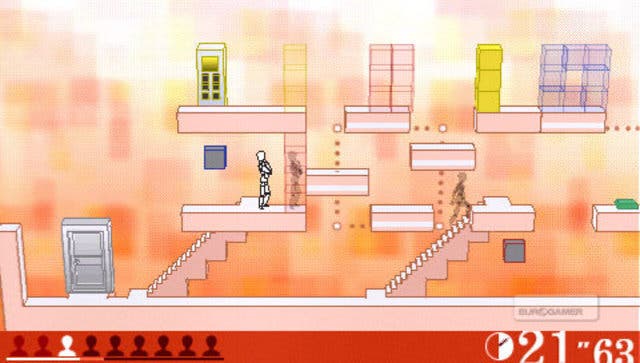echoshift
A shift in time saves nine.
Not so long ago, during a friend's ill-judged stag party in Keswick, I met a chap who helps to manage Piccadilly railway station in Manchester. Honestly, I know nothing of what his job involves - but I imagine that, in between motivational speeches to the chaps who pick the crusted vomit off the night trains, he spends a lot of his time doing the sort of thing which would make him rather good at echoshift.
A sequel to 2008's classy puzzler echochrome, echoshift continues the trend of non-capitalisation and mannequin heroes, but adds a splash of colour to the original's world along with the new mechanic of 'casting' (which replaces echochrome's Escher-style distortion of 3D space). Casting is a concept which players of Braid or the more recent The Misadventures of P.B. Winterbottom will probably be familiar with.
Each level is a puzzle, the solution to which is to reach the exit door. In between your entry point and the door out are various flavours of switch, barrier, enemy and moving platform - negotiate these and you're home free.
Except, generally speaking, they can't be done in a single playthrough. Often a gate is opened by a switch far away, closing again as soon as the pressure on it relinquishes, or by two switches which need depressing at once. So it's over to the new enfant terrible of platforming: that temporal trickery which records your actions and replays them, and their consequences, for you at a later point, allowing you to be in more than one place at a time.

Using as few 'cast members' as possible is the ideal, with stars being awarded for efficiency. These stars unlock further bands of the 56 levels, introducing new mechanics, traps and enemies as they go, as well as opening two new takes on the puzzle you've just completed: key and illusion. Key levels feature, incredibly, a key, which must be picked up by your final cast member on his way to the door. Illusion levels allow you to stop time for 3 seconds per cast, pausing playback of previous casts and maximising potential efficiency.
Because each level has a time limit of 30 to 50 seconds, co-ordinating your various casts to be in the right place to open a gate for an as yet non-existent future you is initially a confusing business. Time pressures are tight, with very little room for error, and often you'll find yourself estimating the progress of several paths in your head at once as you try to timetable your actions effectively. Trying to remember at what stage three or four other independently timed activities are, and to co-ordinate them with the actions you're currently making up as you go along, is quite the tough cookie.
This is where my Piccadilly-managing acquaintance would probably feel at home.

